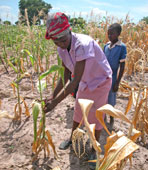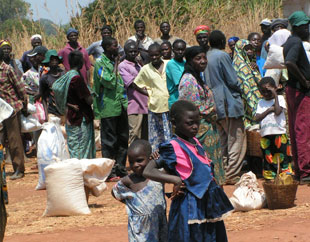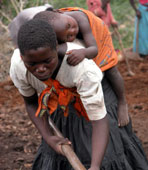In Depth |
|
|
UN SPECIAL ENVOY SAYS TRIPLE THREAT MUST NOT PREVAIL IN SOUTHERN AFRICA
WFP's Executive Director James Morris is also the UN Secretary-General's Special Envoy for Humanitarian Needs in Southern Africa. As he embarks on his fifth mission to the region, he urges that efforts to reverse the decline caused by the "triple threat" of HIV/AIDS, food insecurity and weakened government capacity must not fail. From 22 May - 1 June, Morris plans to visit four countries across Southern Africa, to see for himself how Zambia, Malawi, Botswana and Zimbabwe are coping with crippling poverty, chronic food insecurity and some of the highest adult prevalence rates of HIV/AIDS in the world. HEAVY HEART "I embark on this trip with a heavy heart: to see such suffering, such lost potential, so many lives lost – makes it very hard to keep up hope for the future," said Morris. "Yet amidst all this suffering, I have seen tremendous resilience, dignity and determination. When I look into the eyes of a young mother who has lost her husband and three children to AIDS and malnutrition, and yet remains determined to secure the best possible chances for her surviving baby, I am humbled. "We owe her – and millions more just like her – our continuing support and best efforts." MEETINGS Morris will meet with government officials, donor representatives and aid agencies as well as visit projects and meet with beneficiaries in Zambia and Malawi. On 25 May the Special Envoy will hold a review meeting in Johannesburg to discuss the HIV/AIDS crisis that will include the Executive Directors of UNICEF and UNAIDS, Ann Veneman and Peter Piot. The meeting will examine current interventions, UN reform, and the need to gear up humanitarian response in the face of a more competitive environment for resources. IMMENSE NEED 
Morris' trip to the region comes as Southern Africa It is already evident that
|
| ||||||||||||||||||||||||||

